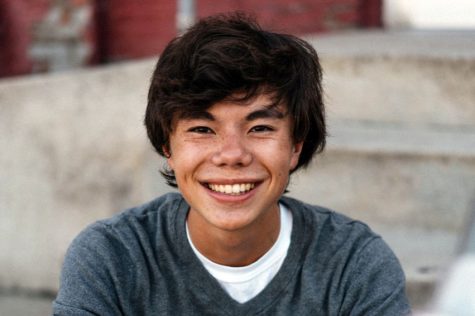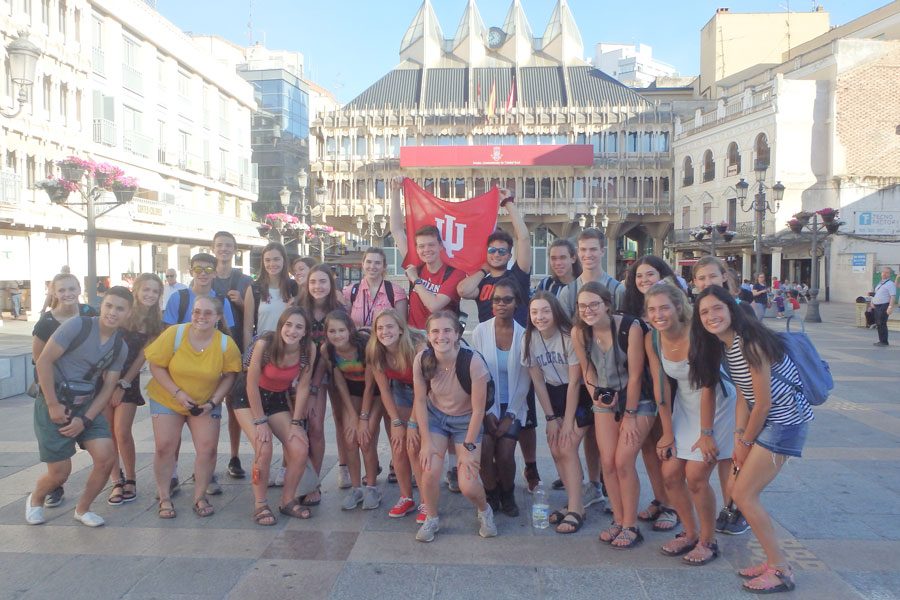Juniors experience summer language program
Dravis, Wright note improvement in their Spanish skills
Two juniors participated in the Indiana University language program over the summer.
One of the best ways to experience a different culture is to place yourself right into the heart of it.
The Indiana University Honors program offers a way for students to expand their worldview. This past summer two juniors, Abygail Dravis and Owen Wright, spent part of their summer in Spain fully immersed in another language and culture.
Students submit an application and small written exam to test Spanish proficiency. They must meet a GPA requirement and have completed a third-year Spanish course. The cost ended up being around $6,000 after all the installments were paid. Wright said part of the application asks about one’s maturity to make sure that students can handle being in a new environment for an extended time.
Rules are strict but intended to create the best possible environment for language acquisition. Phones were confiscated students landed in Spain, and English communication was limited to an hour of emailing a week to check up with parents.
Both students had different exposure to the program to begin with. Wright’s older brother, Clay Wright ‘18, participated in the program two years ago. Wright said that his parents impressed in his Spanish speaking improvement and that it “was almost expected” that he would go, too.
Dravis heard about the program after senior Natalie Schorr gave a presentation in her Spanish class last year. Dravis said that she decided to go on the program because “I’ve been thinking about (Spanish) as a minor (in college), and I wanted to improve my Spanish while in high school.”
Wright felt as if he had an idea of what to expect after hearing about the program from his brother and taking a trip to Spain prior to this past summer. Dravis, on the other hand, had never been out of the country before, so there was a level of anticipation. Nevertheless, both students expressed enthusiasm about their experience.
Part of that experience was getting to know a group of other Indiana students. An orientation took place during which students could get to know each other, and Wright said, “Some of my first words to people were in Spanish.” He said, “Everybody was really inclusive and I spent nearly every day with them, and I still miss hanging out with them.”
Wright and Dravis stayed in a suburb of Ciudad Real, a small town in Central Spain. The town was around the size of Fishers or Carmel but more condensed. They both said they felt extremely safe and about after a week or two they knew the town fairly well. One of the favorite locations was an ice cream shop, Helado Moran, visited almost daily with other group members for treats like turón ice cream, which has a nutty flavor almost like pistachio.
Students stayed with a host family that was matched up by program administrators to suit accommodations for the students. Dravis had a host sister that she grew very close with. Dravis said “she made sure to include me in everything like taking me to her sports and hanging out with her friends.”
Nearly every day, both students would take the bus from the suburbs into Ciudad Real for classes conducted in Spanish about Spanish literature, culture, history and linguistics. Homework was luckily not too difficult and the four classes each last about 45 minutes. Some of these classes, like linguistics, were meant to mirror what the IU equivalent would involve. School was followed by an afternoon group session with activities that included going to the movies or pool or even dance lessons in flamenco or salsa.
Aside from the academics, part of the program included exploring the country with the rest of the IU Honors group. Students visited Madrid, Toledo and Granada, with each city offering a different perspective. In Granada the synthesis of North African and European cultures was displayed through a trip to La Alhambra, a famous mosque in Andalusia.
Wright said that the Arab neighborhood next to the mosque was “different from any other place in Spain.”
Dravis said that Granada was one of her favorite locations, both because of its historical significance, and that she “had a good time because we were just doing things together.”
Traveling with a big group of Americans turned a few heads. Wright said that sometimes people would just come up to them and try to say some of the words and phrases they knew in English. Surprising people with responses in Spanish became just part of conversations.
After such a substantial commitment of money and time, those interested may wonder if the program really works. And luckily the answer is a resounding “yes!” Wright said, “Really the main goal of learning Spanish was accomplished.”
Dravis said, “I was nervous about the quality of my Spanish. I had taken Spanish classes, and I could write it and understand it, but I didn’t know how I would do.” The first few weeks were difficult for both of them. While it was easier to speak to the other Americans in the group, for the first few days, simple yes and no questions were the norm.
But both Dravis and Wright describe an instance where their minds clicked over into Spanish. In the second week, Wright said, “I was thinking to myself about the homework I had and then I realized I was just thinking in Spanish.”
Around the third and fourth weeks Dravis noticed that she no longer had to filter her thoughts in English into Spanish. She said her host family noticed her uptick in ability and spoke faster and congratulated her on her success.
Curiously enough, the transition back to English was difficult when returning back home. Dravis said, “When I got back to the airport in Chicago I couldn’t speak English to save my life. I had to think about my grammar for a hot minute. No one really wanted to speak English, but we realized that we now had to because our parents couldn’t understand us.”
Wright said that there was a very clear difference in his Spanish before and after the trip. At an orientation that took place before he flew to Spain, some instructors asked questions in Spanish to the group. It felt noticeably difficult, but when speaking to those same instructors during the trip, Wright said that he realized he could understand them much more clearly.
Both said that one of the most noticeable improvements was their fluidity between verb tenses. Instead of making a verb chart and thinking through the many different endings, shifting between different tenses and even grammatical moods became a successful subconscious effort.
Dravis said initially “I didn’t know what to think.” But now after such an excursion she said she “wouldn’t trade it for the world, and I’m grateful for all the people who went on the trip with me and my host parents who helped me feel super comfortable.”
Wright and Dravis both agree that at some point, they’ll try to make it back. Dravis said her host family told her that she always has a Spanish home if she wants.
In seven weeks, two students were able to live in a new culture, with new people surrounded by a new language. Deep new friendships, a more meaningful cultural knowledge and a second language to tie it all together. Nothing short of life-changing might describe their experience.

Andrew de las Alas is a senior and reporter for the Megaphone. He runs varsity cross-country, is co-captain of the speech and debate team and co-president...







